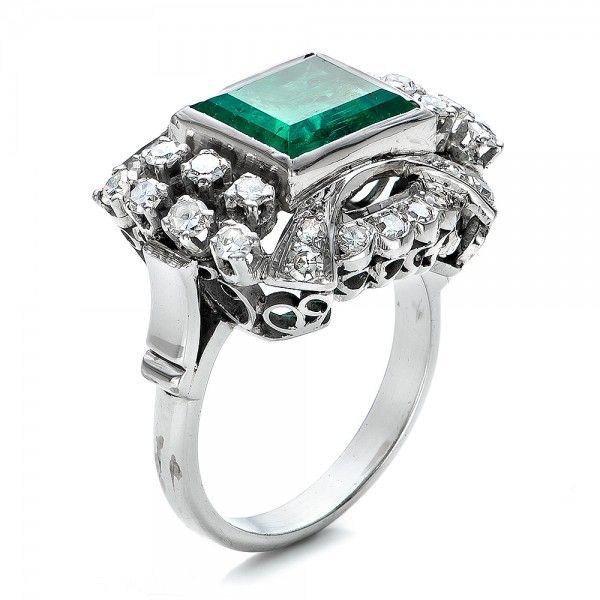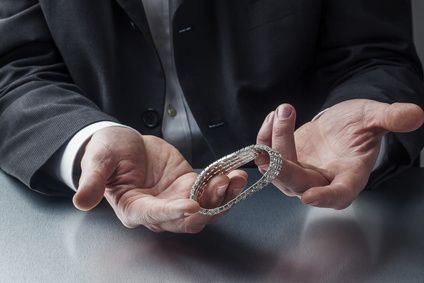
The sentimental value of estate jewelry can be very high. If it has been passed down through generations or inherited by a recently passed loved one, it may stir up old memories or stories from your family’s history.
Because of this if you’ve decided to sell a piece of jewelry, we know it may take time before you’re truly ready to part with it. In fact, we wrote a blog post about that.
But if you recently aquired estate jewelry you think may be valuable, how do you know what it’s really worth and what should you do?
If you’re ready to sell estate jewelry, here’s what you need to know.
What is Estate Jewelry?
People often use the term estate jewelry to describe jewelry that:
- Is antique,
- Has been in the family a long time, or
- Belonged to a deceased person
Technically, estate jewelry doesn’t have to be any of those things. Officially, “estate jewelry” just means it’s pre-owned. It could be from the 21st century or hundreds of years old.
Periods of Estate Jewelry
Estate jewelry can come from any design period. We’ve appraised and purchased 19th century Georgian and Victorian jewelry as well as pieces from the Edwardian, Art Nouveau and Art Deco movements.
We buy jewels and gemstones of all origins and in any form, and love to see diamonds of any cut, from Old Mine to European Cut. If you don’t know where your jewelry is from or what period it belongs to, we can help you get some answers.
How Do I Know What it’s Worth?
The only way to truly know the value of your estate jewelry is to have it evaluated by a certified jeweler. It’s also a good idea to work with a company you really trust or get a second opinion.
There are many factors we consider during the appraisal process. If you meet with one of our buyers, we’ll go through all of them with you.
For now, here are four things you can look at when estimating your estate jewelry’s value:
1. Rarity
How many pieces of jewelry like yours are out there? Would it be difficult to find an exact copy or similar piece? Rarity and uniqueness influence demand for an item, and demand is a major determinant of jewelry’s value.
Estate jewelry can be rare for many reasons. Jewelry containing a very rare gemstone will have a higher value, as will high-quality custom-made jewelry.
2. Who Made It?
Jewelry manufactured by a high end company like Cartier will likely be worth more than mass produced jewelry. Similarly, a one-of-a-kind diamond cut a century ago by a skilled artisan may be worth even more. Historic value definitely counts, depending on the time period and how well the piece’s quality has been preserved.
If your jewelry was made relatively recently, look for the hallmark (also known as a maker’s mark). Most modern jewelry makers engrave their name or logo somewhere in the piece’s metal. If your jewelry is more than 100 years old, you might never know who made it, but an experienced jeweler may be able to help you narrow in on the time period and the region of origin.
3. Materials
Precious stones and metals have intrinsic value. The value of the individual materials that make up your jewelry are a huge factor in determining its worth. High-quality silver jewelry, for example, can be quite valuable.
People don’t always know exactly what their jewelry is made of — especially if it has been passed down through generations or inherited from a distant relative. Some people have very valuable jewelry and don’t even know it.
4. Damage
Most old estate jewelry is not in perfect condition. For example, an engagement ring someone wore most of their life is bound to get a little damaged over time.
If you’re concerned about how damage might affect your estate jewelry’s value, hold it under a magnifying glass and look closely for cracks, chips, scratches, and other marks that can’t be cleaned off.
If you see some, don’t worry. A lack of damage is not the only indicator of value.
Evaluating Estate Jewelry
When it comes to determining estate jewelry’s value, this post will give you a great start. But it’s impossible to know the true value of a piece without a full assessment from a certified jeweler.
When you work with us, we educate you throughout the valuation process. You’ll know exactly how we’re determining your jewelry’s value and you can decide for yourself whether or not you agree with the offer.
If you don’t agree or you have second thoughts about parting with your jewelry, we’ll never pressure you to sell.
Are you ready to find out what you’re state jewelry is really worth?
Call today to make an appointment with one of our expert buyers.






